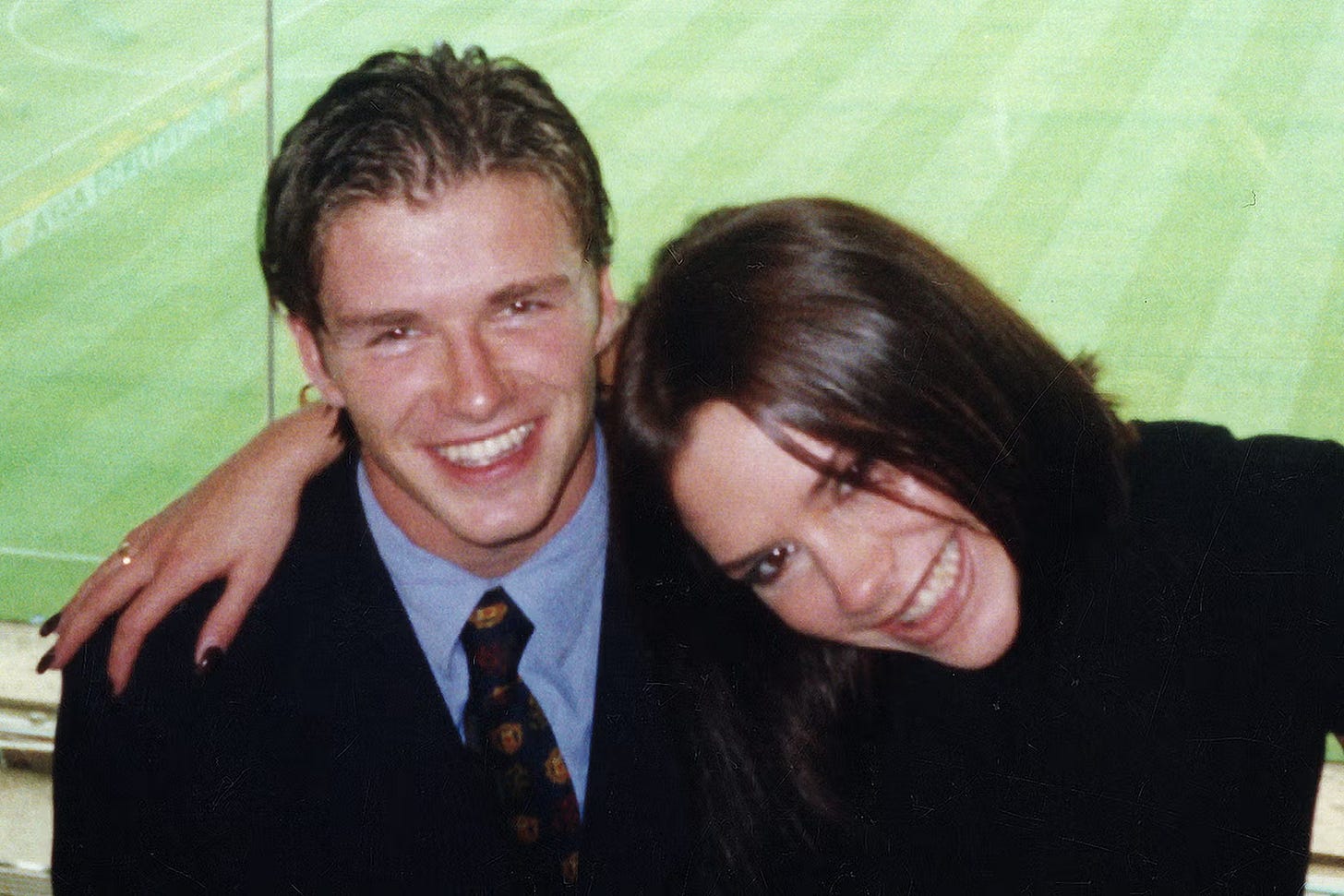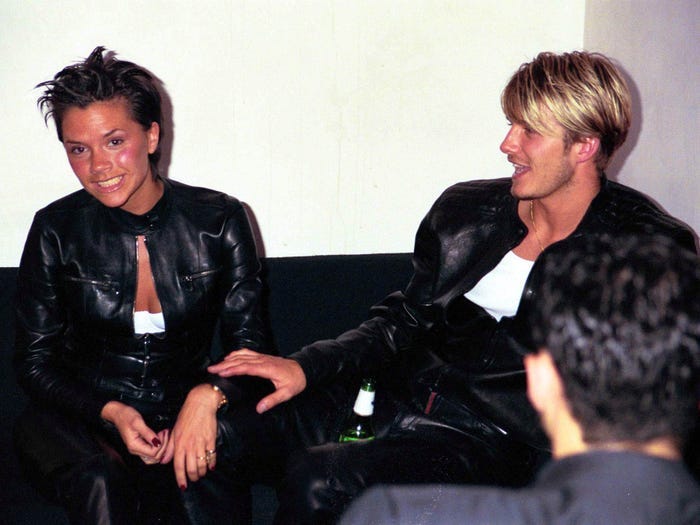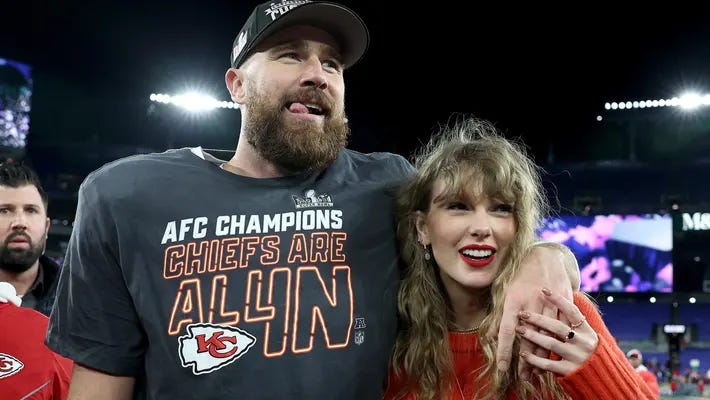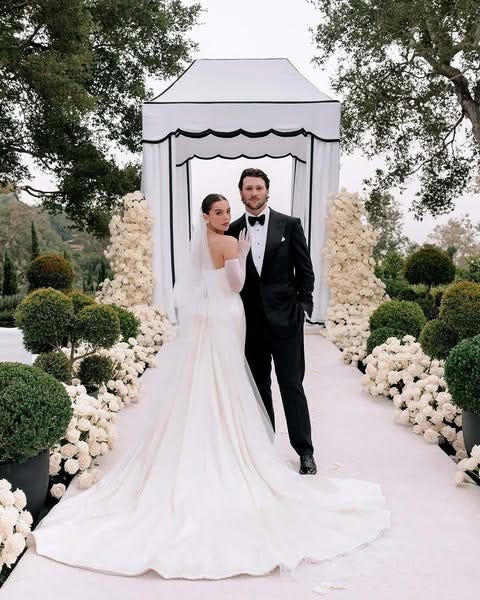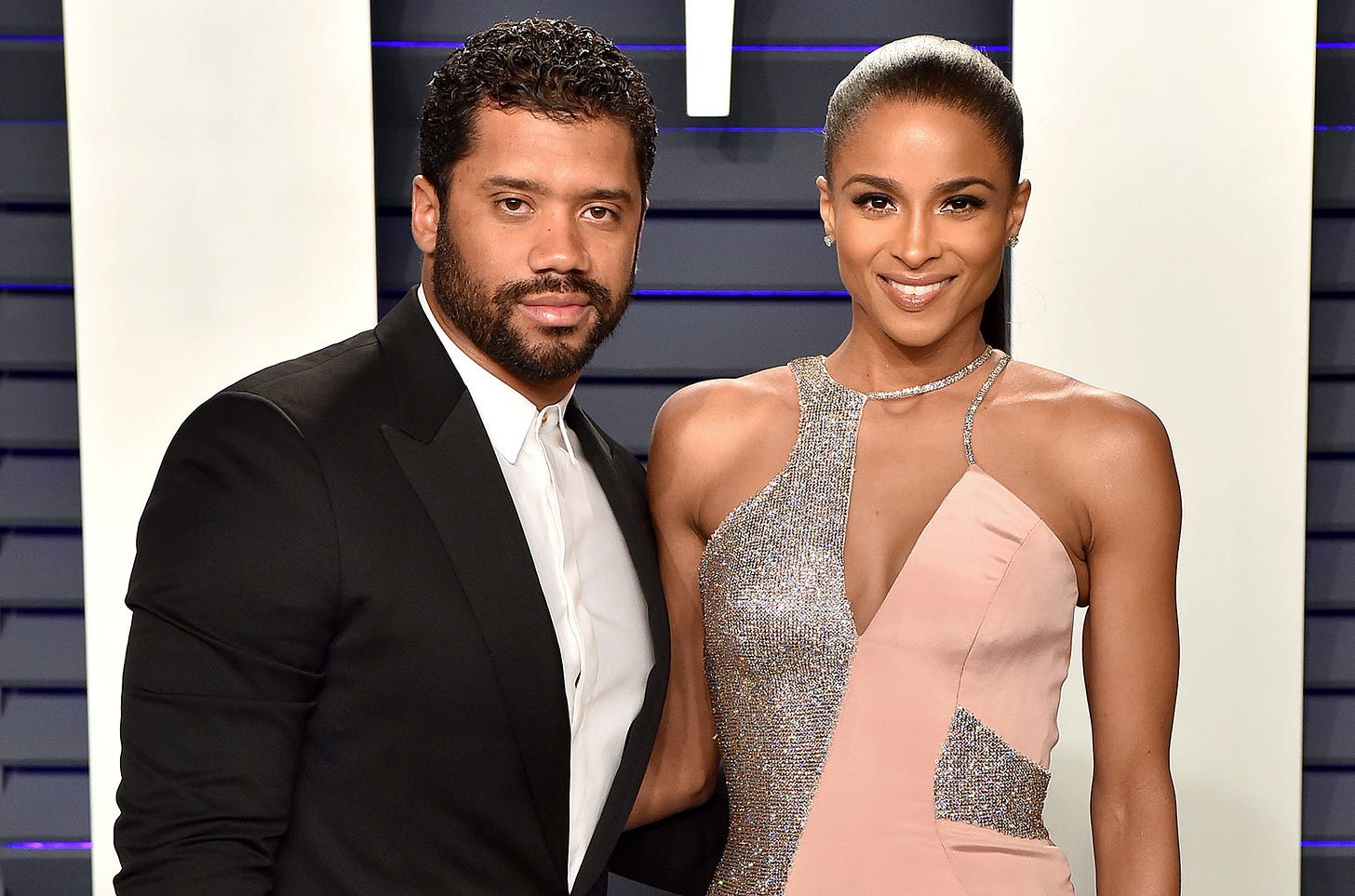The Pop Stars Who Married the Playmakers
From Posh & Becks to Taylor & Travis: Why we're obsessed with the pop star wife + athlete husband formula
The Coronation Moment
Today, Travis Kelce and Taylor Swift announced their engagement, cementing themselves as this generation’s Posh & Becks. Since Victoria and David Beckham met in 1997, the idea of being a WAG (that’s “wives and girlfriends” of athletes) has carried a cultural glow-up—less tabloid curiosity, more dynastic aspiration. Fans do far more than just watch these couples; they participate through parasocial obsession, turning private relationships into public dynasties. The pop star + athlete combo isn’t just romantic; it’s the strategic merging of two empires. It’s giving Game of Thrones: when powerful houses marry, kingdoms realign.
The Blueprint — Posh & Becks
David and Victoria Beckham met when Victoria was at peak Spice Girls fame and David was a rising star at Manchester United. Within a year, they were engaged, and the media obsession kicked into overdrive.
The UK press was vicious and relentless, camping outside their home and turning their relationship into daily tabloid fodder. Victoria was branded a “gold-digger,” while David was painted as a bad boy after his infamous red card against Argentina in the 1998 World Cup.
And yet, instead of shrinking back, they doubled down. Matching leather outfits, glossy magazine covers, Victoria’s pivot into fashion, David’s multimillion-dollar sponsorship deals—together they built a brand as much as a marriage. Even when the rumor mill churns (alleged affairs, trial separations, whispers of cracks in the empire), they have kept the machine running. And now, 30 years later, they’re still presenting a united front, even as they get dragged into fresh family drama with their son, Brooklyn and his wife, Nicola Peltz.
The Beckham documentary that dropped last year confirmed what we all suspected: their bond was survival training for life in the public eye. And crucially, it showed how much of their bond was mediated through the public gaze—fans felt like they knew them, but in reality, they only knew the brand. That’s the same parasocial loop Taylor and Travis are now orbiting, only supercharged by a 24/7 social media news cycle.
The Heirs Apparent — Taylor & Travis
Just two years after the start of their whirlwind romance, Taylor and Travis announced their engagement. It wasn’t a huge surprise—fans had already been speculating that they were secretly married (a standard online theory whenever Taylor’s relationships stretch past six months). Her announcement of her album on his podcast made it obvious that Travis was more than just a boyfriend. Still, the engagement caused a global pop culture earthquake. I happened to be in a work meeting when my phone started blowing up with News app notifications and texts from my friends — even my husband.
With these two, Taylor is obviously the dominant partner in fame, but Travis is the first of her boyfriends who can hold his own beside her and doesn’t appear intimidated by her fame or rabid fandom.
So, why can’t we look away? The short answer is that their relationship feels both intimate (through constant coverage) and performative (a parasocial soap opera in real time). Paired with her constant releasing of music, fans feel like Taylor is a close personal friend, and that maybe, just maybe, they’ll score an invite to the wedding of the century.
The Formula Applied Elsewhere
Swift and Kelce might be the coronation moment of the formula right now, but they’re not an anomaly. The pop star + athlete pairing is a pattern that resurfaces again and again because it gives audiences a ready-made narrative: two separate empires colliding, and the public deciding whether it’s aspirational, messy or somewhere in between.
Ciara and Russell Wilson show how stability can be its own brand. Their marriage is built around faith, family and mutual devotion, and for many fans it’s an aspirational model of what love in the spotlight can look like. At the same time, Russell has been criticized for being a “simp” with critics (read: men) labeling him corny and distracted from the game. Their union proves that even the utmost wholesomeness can still be polarizing when lived out on a public stage.
Shakira and Gerard Piqué represent the downsides of the formula. She was the world-conquering superstar, he was a Barcelona fútbol legend, and together they seemed untouchable… until they weren’t. Their breakup, caused by Piqué’s infidelity, became a cultural spectacle, amplified by Shakira’s revenge anthem that shattered streaming records. In their case, the scandal only deepened public obsession, showing how this formula thrives whether the story is about a wedding or a betrayal.
Hailee Steinfeld and Josh Allen are the quieter counterparts to TnT. She’s a pop star and actress with her own established career, and he’s an NFL MVP and the face of the Buffalo Bills. They don’t chase headlines, but their paparazzi coffee runs and private California wedding still reinforce the appeal of the archetype. Even at its most understated, the formula works because it merges two different worlds into one storyline that audiences can’t resist.
Why We Can’t Look Away
At the end of the day, Swift and Kelce are a cultural lightning rod. Like the Beckhams before them, their engagement taps into something primal: we love to measure power, gossip about imbalance, and project ourselves into the drama. Whether it’s Ciara and Russell Wilson praying on the field, Shakira turning betrayal into a global hit, or Hailee and Josh Allen playing it low-key, the pattern repeats: pop star meets athlete, and suddenly it’s bigger than both careers.
The real fascination lies in the suspense. Will Swift and Kelce become the next Beckhams—weathering decades of scrutiny, rumors, and even family drama while staying united? Or will they veer into Shakira-and-Piqué territory, giving us a global spectacle we can’t look away from? Either way, the public has already decided: this isn’t just their love story. It’s ours: to watch, to narrate, and to debate until the final credits roll.



